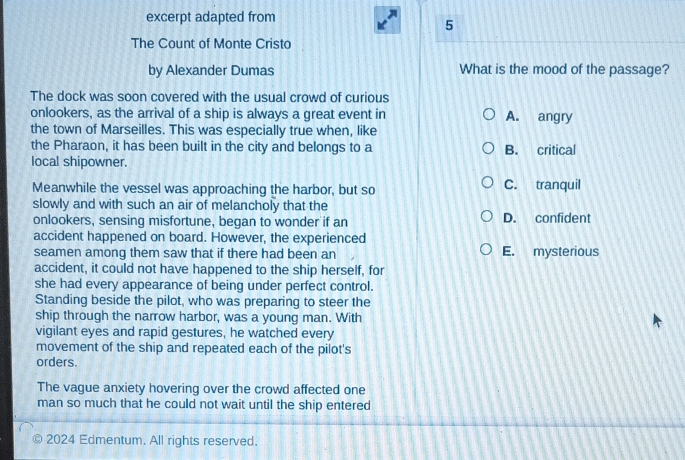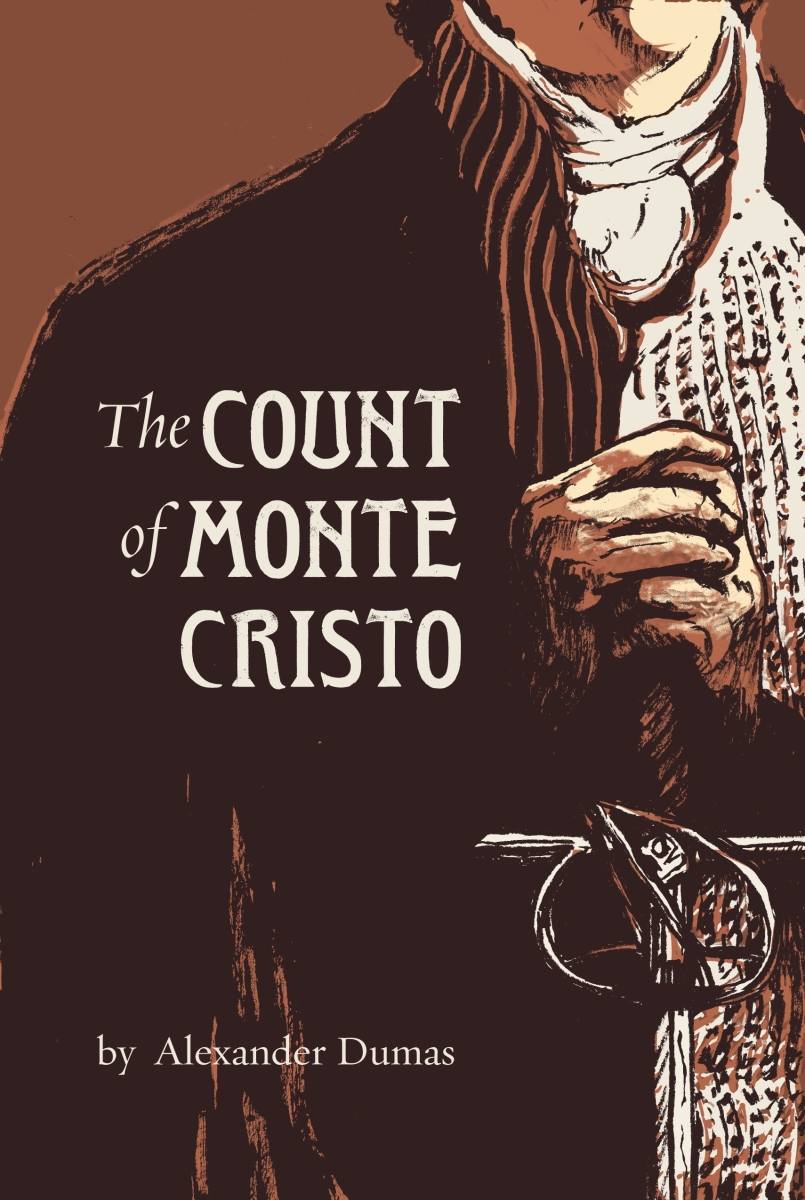Revisiting Dumas' The Count Of Monte Cristo: A Critical Review

Table of Contents
The Allure of Revenge: Exploring Edmond Dantès' Journey
The central theme of The Count of Monte Cristo is undoubtedly revenge. Edmond Dantès' transformation from a naive, hopeful young sailor to the cunning and vengeful Count is a compelling exploration of human nature pushed to its limits. His unjust imprisonment, orchestrated by jealous rivals, fuels a burning desire for retribution that consumes his life.
- The ethical implications of Edmond's actions: While readers sympathize with Edmond's suffering, the meticulous and often cruel nature of his revenge raises ethical questions. Is revenge ever truly justified? Does the end justify the means, even when those means involve significant collateral damage? Dumas forces us to confront these difficult questions.
- The psychological impact of unjust imprisonment: Edmond's time in the Château d'If is not merely a plot device; it's a crucible that forges his character. The psychological trauma of wrongful imprisonment, isolation, and the erosion of hope profoundly shape his actions and motivations upon his escape. This prolonged suffering fuels his insatiable desire for vengeance.
- The complexities of revenge and its consequences: Dumas masterfully depicts the complexities of revenge, showing that it's a double-edged sword. While Edmond extracts his pound of flesh, he also inflicts pain and suffering on those around him, often unintentionally. The novel explores the corrosive nature of revenge, suggesting that it seldom brings lasting peace or happiness.
Masterful Plotting and Narrative Structure: A Testament to Dumas' Skill
Dumas's skill as a storyteller is evident in the intricate plot of The Count of Monte Cristo. The novel is a masterclass in suspense, employing plot twists and turns that keep the reader guessing until the very end. The interconnectedness of characters and their interwoven fates adds another layer of complexity, creating a rich tapestry of relationships and betrayals.
- The effectiveness of the flashback structure: The novel's structure, weaving together past and present, enhances the suspense and allows the reader to understand the motivations of the characters fully. The flashbacks are not merely informative but integral to building tension and revealing the extent of Edmond's suffering.
- The pacing and its contribution to the overall narrative: Dumas expertly manages the pacing of the narrative, seamlessly shifting between moments of intense action and quieter, more introspective scenes. This skillful pacing prevents the novel from feeling rushed or overly drawn out.
- The use of foreshadowing and its impact on reader engagement: The use of foreshadowing throughout the novel adds another layer of suspense, prompting the reader to anticipate future events and re-evaluate past occurrences. This technique significantly enhances reader engagement.
Themes of Justice, Betrayal, and Redemption in The Count of Monte Cristo
Beyond revenge, The Count of Monte Cristo explores profound themes of justice, betrayal, and redemption. These themes are intricately interwoven throughout the narrative, adding depth and complexity to the story.
- Poetic justice and its presence in the novel: The novel explores the concept of poetic justice, where characters receive a fitting punishment for their actions, often in unexpected ways. However, Dumas doesn’t offer a simplistic view of justice; the lines between right and wrong are often blurred, leaving the reader to contemplate the true meaning of justice.
- The different forms of betrayal experienced by Edmond Dantès: Edmond's betrayal is multifaceted; he is betrayed by friends, lovers, and society itself. This layered betrayal highlights the vulnerability of innocence and the devastating consequences of unchecked ambition and greed.
- The possibility of true redemption for the characters: The question of redemption hangs over the novel. While some characters find a path towards atonement, others remain trapped by their past actions. This ambiguity adds to the novel's enduring complexity.
The Count of Monte Cristo's Enduring Legacy and Modern Relevance
The Count of Monte Cristo has had a lasting impact on literature and popular culture, inspiring numerous adaptations in film, television, and other media. Its exploration of timeless themes, such as power, betrayal, and social injustice, continues to resonate with modern audiences.
- Adaptations to film, television, and other media: From classic film adaptations to modern television series, the story of Edmond Dantès has been retold countless times, a testament to its enduring appeal.
- Timeless themes like power, betrayal, and social injustice: The novel's themes are as relevant today as they were in Dumas's time. The exploration of power dynamics, the consequences of betrayal, and the fight against social injustice continue to resonate with contemporary readers.
- Continued popularity with modern readers: The enduring popularity of The Count of Monte Cristo demonstrates its timeless appeal. The gripping plot, compelling characters, and exploration of complex human emotions continue to captivate readers in the 21st century.
Conclusion
In conclusion, The Count of Monte Cristo remains a powerful and captivating work of literature. Its exploration of revenge, justice, betrayal, and redemption, coupled with Dumas's masterful storytelling, ensures its enduring legacy. The novel's intricate plot, compelling characters, and timeless themes make it a must-read for anyone interested in classic literature. We urge you to revisit, or perhaps discover for the first time, the thrilling world of Dumas's Count of Monte Cristo, and experience the enriching and suspenseful journey for yourself. Reading The Count of Monte Cristo is an experience that will stay with you long after you turn the final page.

Featured Posts
-
 Gambling On Calamity Examining The Market For Wildfire Bets In Los Angeles
May 05, 2025
Gambling On Calamity Examining The Market For Wildfire Bets In Los Angeles
May 05, 2025 -
 Report Kanye Wests Alleged Control Of Bianca Censoris Life
May 05, 2025
Report Kanye Wests Alleged Control Of Bianca Censoris Life
May 05, 2025 -
 Eurovision 2024 Leslies Next Challenge
May 05, 2025
Eurovision 2024 Leslies Next Challenge
May 05, 2025 -
 Is The Count Of Monte Cristo Still Relevant Today A Modern Review
May 05, 2025
Is The Count Of Monte Cristo Still Relevant Today A Modern Review
May 05, 2025 -
 Auto Dealers Intensify Opposition To Mandatory Ev Sales
May 05, 2025
Auto Dealers Intensify Opposition To Mandatory Ev Sales
May 05, 2025
Latest Posts
-
 Canelo Alvarez Offers Jake Paul Post Engagement Relationship Advice
May 05, 2025
Canelo Alvarez Offers Jake Paul Post Engagement Relationship Advice
May 05, 2025 -
 Canelo Alvarezs Marriage Advice To Jake Paul After Engagement
May 05, 2025
Canelo Alvarezs Marriage Advice To Jake Paul After Engagement
May 05, 2025 -
 Canelo Crawford The Potential For A Massive Upset
May 05, 2025
Canelo Crawford The Potential For A Massive Upset
May 05, 2025 -
 Canelo Vs Crawford Predicting The Upset
May 05, 2025
Canelo Vs Crawford Predicting The Upset
May 05, 2025 -
 Eubank Jr My Fight With Benn Bigger Than Any Canelo Matchup
May 05, 2025
Eubank Jr My Fight With Benn Bigger Than Any Canelo Matchup
May 05, 2025
